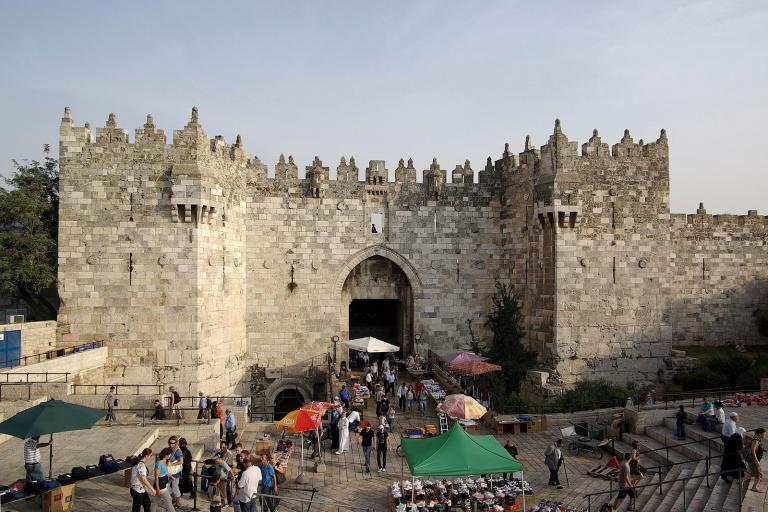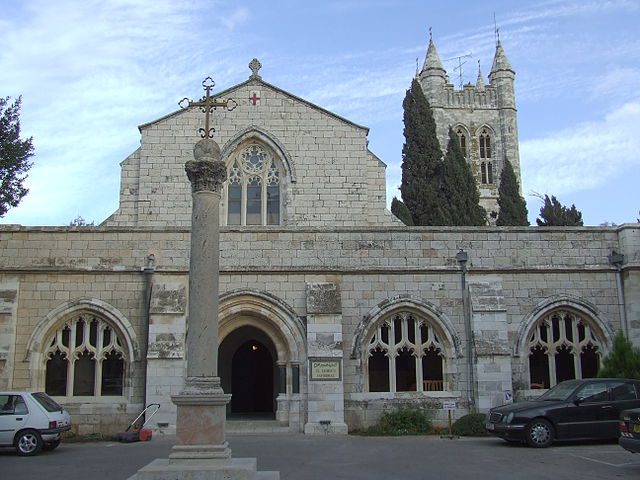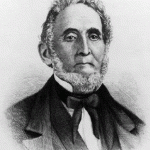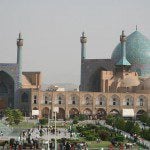
(Wikimedia Commons public domain image)
My wife and I hadn’t expected to be in Israel again this month. We were just here in November, after all, and we’re scheduled to be back again at the very end of October. A relatively short while ago, however, an extended family that I still have not met — we’ll meet them tomorrow, probably at Ben Gurion Airport — asked me to accompany them around the Jerusalem area. So here we are again. At the late date that we were invited, we couldn’t match their flight schedule. Accordingly, and of necessity, we’ve arrived a couple of days early, which means that this is the most relaxed beginning to a tour that we’ve ever enjoyed.
Until our group arrives, we’re staying in a small Arab hotel in East Jerusalem where we know the owner. The Israeli Jewish taxi driver who brought us to the hotel from the airport was very concerned about its location. (It’s not far from the Old City’s Damascus Gate and very near to St. George’s Cathedral.) The taxi driver is a resident of Rishon LeZion (pronounced something like Ree-shone le-tziyyon, meaning “First to Zion,” from Isaiah 41:27), which was founded in 1882 down on the coast plain by settlers from the Russian Empire (specifically, from what is today Kharkiv, Ukraine). It was the first Zionist settlement in Palestine under what is called the “New Yishuv,” the beginning of modern secular Zionism.
From his appearance, I’m guessing that the taxi driver himself may have been of originally Russian extraction. He was a very nice fellow and, from the moment that we met him at the airport, even before we entered his taxi, he began to warn us about the dangers of Arab East Jerusalem. He gave us the number for the police (emphasizing their rapid response time) and, as we approached our hotel, he pointed out various police stations and even the district courthouse that we were passing. He particularly warned us against entering the Shaykh Jarrah area; I didn’t tell him that, for my first months in Israel many years ago, I lived in the Shaykh Jarrah area. Finally, his curiosity overcame him, and he asked why we were staying in an East Jerusalem hotel. We told him, truthfully, that it was to save money while we waited for our group to arrive, and because, by the time we began to seek lodging, there weren’t many places available.
He assured us repeatedly that he wouldn’t just leave us at our hotel, that he would wait with us until we were safely inside. And he kept his word — rather bravely, I think, because I expect that he was also worried both for his taxi and himself. The hotel knew that we would be arriving from Ben Gurion at about 4:15 AM but, when we reached it, the doors were locked and we could raise nobody by knocking or ringing the doorbell. He stood with us until we managed to reach the desk clerk, who had obviously been sleeping somewhere inside, by telephone. And then he helped us to bring our luggage into the lobby, apologizing to the Arab desk clerk (in English) for having awakened him. A good man.
I myself never felt nervous until, at first, we couldn’t get into the hotel. Then, for a few minutes, I worried about where we were actually going to be able to get a room. But the taxi driver’s warnings weren’t merely silly.
Israelis are commonly nervous about being on the Arab side of Israel, and they have grounds for their nervousness. Moreover, there has been a slightly unusual amount of Arab-Israeli friction over the past few weeks, with multiple deaths. And the fact that I’m very sympathetic to the Arabs here would likely make little difference: I’m obviously Western, my appearance might even possibly look Israeli, and, if I managed to say anything in Arabic before being assaulted, I might possibly merely confirm my Israeli-ness thereby. After all, how many Americanos speak Arabic?
Many years ago, my wife and I became slightly acquainted in Cairo with Ann and Malcolm Kerr; very close friends of ours were were close friends of theirs. An Arabist and a well-respected scholar of modern Middle Eastern history and politics, he had been president of the Middle East Studies Association and a distinguished member of the faculty at UCLA. My wife taught the Kerrs’ son Steve — a future NBA basketball player and the current head coach of the Golden State Warriors — at Cairo American College. Shortly after we met the Kerrs in Cairo, he accepted the presidency of the American University of Beirut, near which he had grown up and where he had met his wife. I still remember the sick feeling that I had when I heard the news in January 1984 that an American professor had been assassinated in Lebanon; I knew instantly that it was Malcolm Kerr, even before CNN mentioned the name. And the mood among the faculty at UCLA, where, by then, I was working toward my doctorate, was absolutely funereal. Malcolm Kerr was universally well liked by his former colleagues. But, alas, neither that nor being sympathetic to the Arabs guarantees protection against the mindless violence of Arab extremists.
The flights over from Salt Lake City were uneventful, which I always appreciate. (I’ve only experienced one unscheduled landing. Perhaps I’ll tell that story here sometime, while I’m still thinking of it.) But there were two nice moments, apart from my reading and the movies I watched:
First, ascending out of Paris, we flew over the city. Once before, I had a nice nighttime view of the Eiffel Tower. But not this time. On this occasion, there were rain clouds below us. They were thin, and the brightness of “the city of light” — I know, the epithet is about “enlightenment” and cultural “illumination,” not literally about street lamps — shone beautifully through them, with occasional breaks in the clouds that permitted glimpses of the brilliant lights of the city below. The scene reminded me, curiously, of the opening of some movie or other about Peter Pan, as we descend down through the clouds above London toward the home of Wendy Darling and her family. It seemed like a painting.
Second, although the night outside was pitch dark and cloudy most of the way, for about ten minutes I had a very nice view out my window of the Turkish coast of the Aegean Sea, roughly between (I’m guessing) İzmir and Kuşadası. Wonderful places that I haven’t seen in quite a while but hope to visit again in October.

Wikimedia Commons public domain photo by Chris Yunker
I close with three short and unrelated notes:
- In two separate items that I read on the airplanes, each author used the word principle at least twice where it should have read principal. This has become something of a pet peeve of mine.
- Contrary to the (possibly insincere, or perhaps merely willfully ignorant) insinuations of certain of my critics, I certainly believe that salvation is possible for believers in the “Heartland” model of Book of Mormon geography. I’ve never suggested otherwise, and I regard the idea that one’s eternal destiny might hang upon properly identifying the site of Zarahemla or of the Jaredite city of Lib as completely ludicrous. Beyond my acknowledged academic disagreement with their model, my problem with some Heartlanders is simply, as I’ve said before, the fact that some of them apparently want to read those who don’t buy their geographical model out of the Church. Geographical models are interesting, but Book of Mormon geography is, in my judgment, a tertiary matter at most.
- Finally, I found this article, by Stephen Cranney and Jacob Hess, extremely interesting: “Perspective: BYU — the most politically balanced university in America? According to an analysis of political donations, Utah universities are more ideologically balanced than most, with BYU topping the chart” I could, of course, wish that the faculty of BYU were more inclined to my own free-market, federalist, limited-government views than they apparently are, but I nonetheless accept this morsel with considerable satisfaction.
Posted from Jerusalem, Israel













